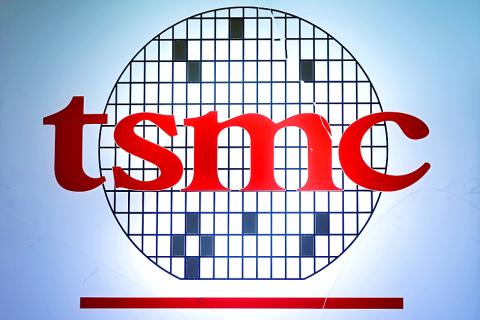Taiwan Semiconductor Manufacturing Co (TSMC, 台積電) yesterday said it would continue supplying wafers and technologies to Huawei Technologies Co (華為) as its exports are in full compliance with international trade rules, despite the US’ latest sanctions on the Chinese firm.
The chipmaker’s move came as a slew of global firms followed the lead of Aphabet Inc’s Google in cutting ties with the world’s No. 2 smartphone maker after Washington put Huawei on a blacklist.
TSMC, which counts Huawei among its top clients, said that it is the company’s long-term practice to conduct due diligence on every product it exports to make sure it is in compliance with international trade rules.

Photo: Reuters
“Based on our due diligence, we do not anticipate any major changes in how we ship wafers and how we deliver technologies to this client,” TSMC spokesperson Elizabeth Sun (孫又文) said on the sidelines of the chipmaker’s annual technology symposium in Hsinchu.
TSMC products contain less than 25 percent US-origin software and technology during the production process, Sun said, citing an internal assessment and an appraisal from an outside counsel from the US.
“We are our customers’ enabler. That includes HiSilicon Technologies Co (海思半導體),” Sun said.
HiSilicon helps design in-house premium mobile processors, including the Kirin family used in Huawei’s high-end smartphones.
TSMC said that some of it clients have said they would stop could lead to reduced orders from certain clients.
The company does not plan to revise down its second-quarter financial forecast.
It is sticking to its forecast of revenue growing at a quarterly pace of 7 percent this quarter.
TSMC said it does not plan to accelerate capacity expansion at its new factory in Nanjing to cope with the escalating US-China trade dispute.
Its goal is to boost annual capacity at the 12-inch fab to 15,000 wafers by the end of this year and to 20,000 wafers next year.
TSMC chief executive officer C.C.Wei (魏哲家) added that the company is committed to investing heavily in Taiwan.
Over the past five years, TSMC has spent US$50 billion on capacity expansion and technology development, he said.
This year, the company plans to invest between US$10 and US$11 billion on new facilities and equipment, which should increase total annual capacity by about 2 percent to 12 million wafers.
TSMC has started equipment installation at its Fab 18, paving the way for the company to produce the world’s first 5-nanometer chip in the first quarter next year.
The company has also earmarked a piece of land for next-generation 3-nanometer chips, Wei said.

PATENTS: MediaTek Inc said it would not comment on ongoing legal cases, but does not expect the legal action by Huawei to affect its business operations Smartphone integrated chips designer MediaTek Inc (聯發科) on Friday said that a lawsuit filed by Chinese smartphone brand Huawei Technologies Co (華為) over alleged patent infringements would have little impact on its operations. In an announcement posted on the Taiwan Stock Exchange, MediaTek said that it would not comment on an ongoing legal case. However, the company said that Huawei’s legal action would have little impact on its operations. MediaTek’s statement came after China-based PRIP Research said on Thursday that Huawei filed a lawsuit with a Chinese district court claiming that MediaTek infringed on its patents. The infringement mentioned in the lawsuit likely involved

Taipei is today suspending work, classes and its US$2.4 trillion stock market as Typhoon Gaemi approaches Taiwan with strong winds and heavy rain. The nation is not conducting securities, currency or fixed income trading, statements from its stock and currency exchanges said. Authorities had yesterday issued a warning that the storm could affect people on land and canceled some ship crossings and domestic flights. Taiwan Semiconductor Manufacturing Co (TSMC, 台積電) expects its local chipmaking fabs to maintain normal production, the company said in an e-mailed statement. The main chipmaker for Apple Inc and Nvidia Corp said it has activated routine typhoon alert

GROWTH: TSMC increased its projected revenue growth for this year to more than 25 percent, citing stronger-than-expected demand for AI devices and smartphones The Taiwan Institute of Economic Research (TIER, 台灣經濟研究院) yesterday raised its forecast for Taiwan’s GDP growth this year from 3.29 percent to 3.85 percent, as exports and private investment recovered faster than it predicted three months ago. The Taipei-based think tank also expects that Taiwan would see a 8.19 percent increase in exports this year, better than the 7.55 percent it projected in April, as US technology giants spent more money on artificial intelligence (AI) infrastructure and development. “There will be more AI servers going forward, but it remains to be seen if the momentum would extend to personal computers, smartphones and

Catastrophic computer outages caused by a software update from one company have once again exposed the dangers of global technological dependence on a handful of players, experts said on Friday. A flawed update sent out by the little-known security firm CrowdStrike Holdings Inc brought airlines, TV stations and myriad other aspects of daily life to a standstill. The outages affected companies or individuals that use CrowdStrike on the Microsoft Inc’s Windows platform. When they applied the update, the incompatible software crashed computers into a frozen state known as the “blue screen of death.” “Today CrowdStrike has become a household name, but not in